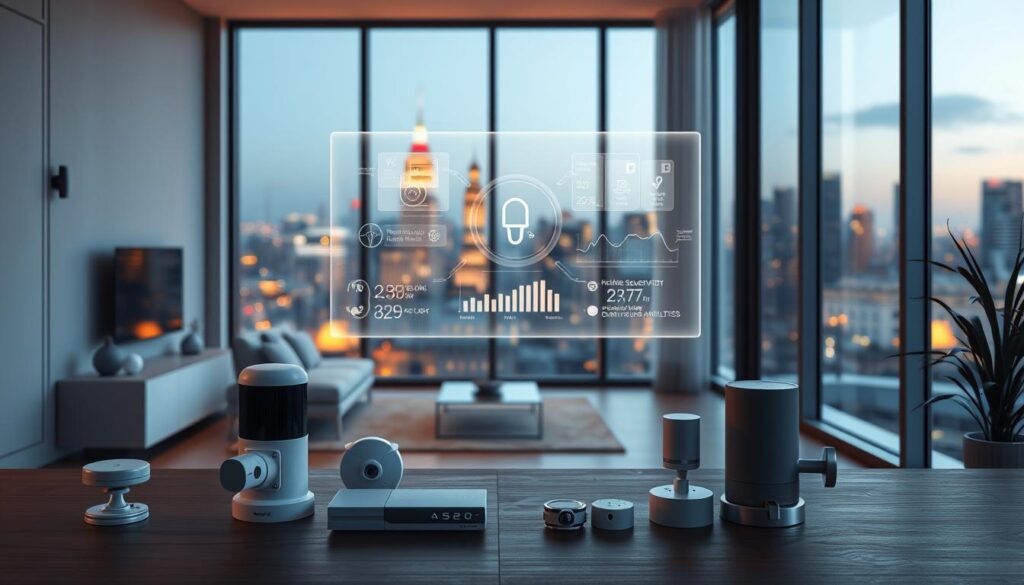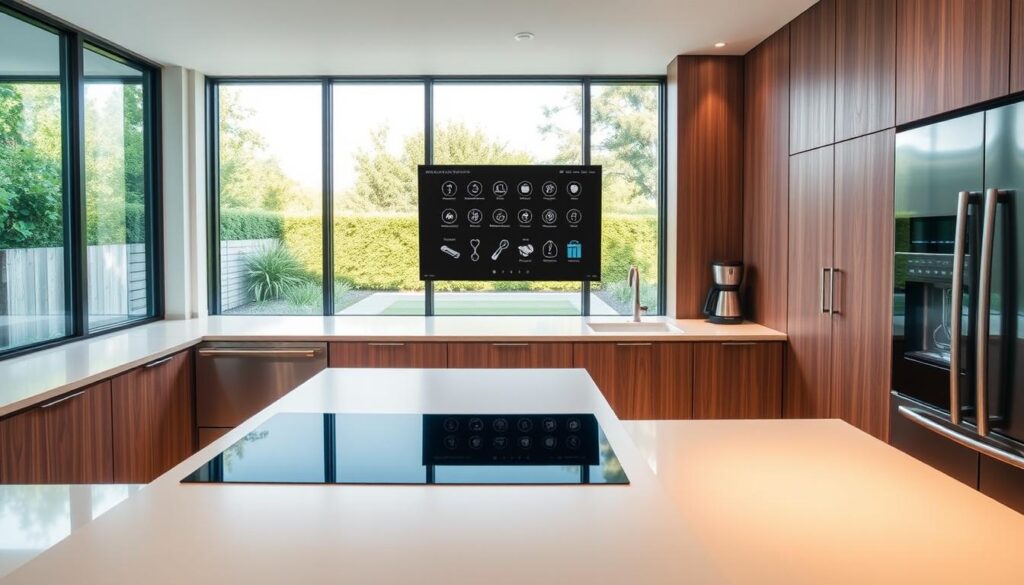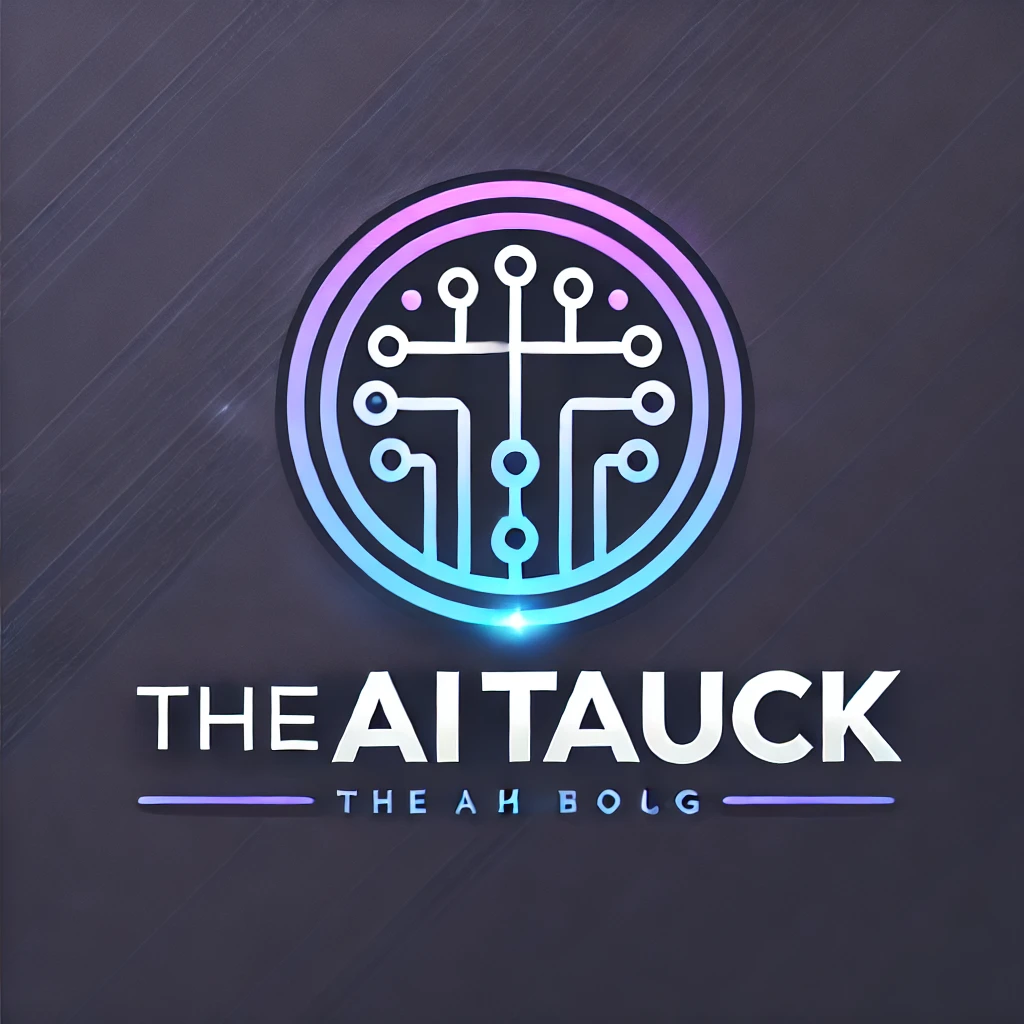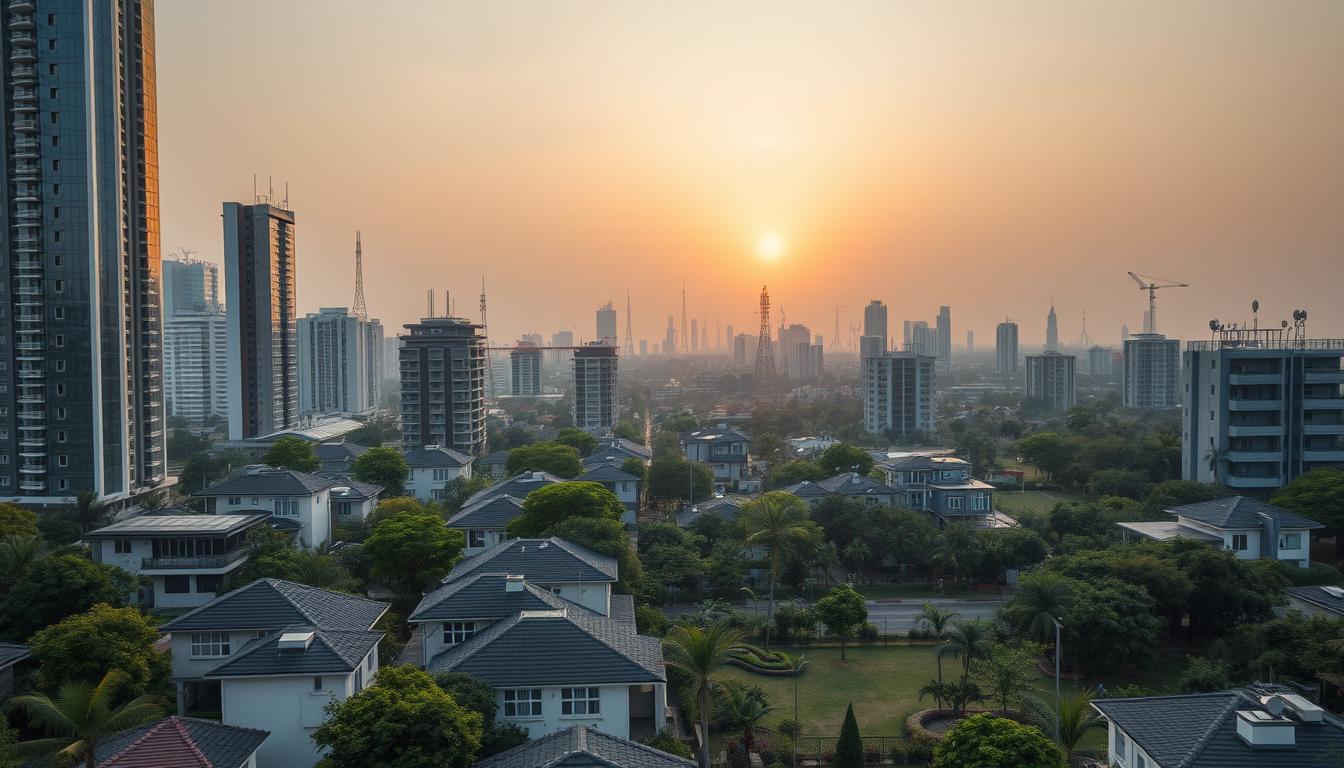Imagine a home that adjusts its temperature, lighting, and security according to your preferences, all controlled with just your voice. In India, this is becoming a reality with the advent of smart homes. The integration of Artificial Intelligence (AI) in home automation is transforming the way we live, making our homes more comfortable, efficient, and secure.
As urbanization increases, Indians are embracing voice-controlled home automation and AI-driven solutions for elderly care, enhancing the quality of life. Moreover, energy-efficient homes with AI are reducing energy consumption, contributing to a more sustainable future.
The concept of AI homes is gaining traction, especially in metropolitan cities like Mumbai, where smart apartment systems are being adopted to improve living standards.
Key Takeaways
- Smart homes are revolutionizing living standards in India.
- Voice-controlled home automation is on the rise.
- AI is enhancing elderly care in Indian homes.
- Energy-efficient homes are becoming more prevalent.
- Smart apartment systems are being adopted in cities like Mumbai.
The Rise of AI HOMES in India
The rise of AI homes in India is a testament to the country’s rapid technological progress and urbanization. As the demand for smart living solutions grows, the Indian market is responding with innovative AI-powered home technologies.
Current Market Trends
The Indian smart home market is driven by several key trends. Increasing urbanization and a growing middle class are fueling the demand for smart homes. Additionally, the proliferation of IoT devices and advancements in AI technology are making smart homes more accessible and affordable.
Growth Statistics in Metropolitan Areas
Metropolitan areas in India are witnessing significant growth in the adoption of AI homes. Cities like Mumbai, Delhi-NCR, and Bangalore are leading the way, with a surge in smart home projects and investments.
Consumer Demand Patterns
Consumers in India are increasingly looking for smart home solutions that offer convenience, security, and energy efficiency. There is a growing demand for voice-controlled home automation systems and AI-powered security solutions.
Adoption Rates Across Major Cities
The adoption rates of AI homes vary across major cities in India. Factors such as infrastructure, consumer awareness, and technological readiness play a crucial role in determining the adoption rates.
Delhi-NCR Region Analysis
The Delhi-NCR region is a significant hub for AI home adoption, driven by high disposable incomes and a growing awareness of smart home technologies.
Bangalore as a Tech Hub for Smart Homes
Bangalore, known as the tech hub of India, is also emerging as a leader in the smart home market. The city’s tech-savvy population and the presence of numerous startups and companies in the smart home sector are driving innovation and adoption.
Understanding Smart Home Technology
You might be wondering how smart homes work; it’s all about the sophisticated technology that powers them. Smart home technology encompasses a range of innovative solutions designed to make your life more convenient, efficient, and enjoyable.
Core Components of an AI Home System
The core of any smart home lies in its central hub and control units, along with IoT sensors and devices. These components work in tandem to create a seamless and integrated living experience.
Central Hub and Control Units
The central hub acts as the brain of your smart home, connecting various devices and allowing you to control them through a single interface. This can be a dedicated device or an app on your smartphone.
IoT Sensors and Devices
IoT sensors and devices are the eyes and ears of your smart home, detecting changes in the environment and responding accordingly. They can include motion sensors, temperature sensors, and smart appliances.
How AI Integrates with Home Infrastructure
AI integration with home infrastructure can be achieved in two primary ways: retrofitting existing homes and incorporating smart technology into new constructions.
Retrofitting Existing Homes
Retrofitting involves upgrading your existing home with smart devices and systems. This can be a cost-effective way to enjoy the benefits of smart home technology without the need for major renovations.
New Construction Integration Standards
For new constructions, integrating smart home technology from the ground up can provide a more streamlined and efficient solution. This approach allows for the incorporation of smart features into the building design.
Voice-Controlled Home Automation Systems
Voice-controlled home automation systems are transforming the Indian home experience. With the integration of AI-powered voice assistants, you can now control various aspects of your home, from lighting to security, using just your voice.
Popular Voice Assistants in the Indian Market
The Indian market has seen a rise in popularity of voice assistants such as Google Assistant, Amazon Alexa, and Apple Siri. These assistants have become integral to smart home systems, offering a range of functionalities that make home management easier.
Localized Features for Indian Users
One of the key features that have contributed to the success of these voice assistants in India is their ability to offer localized support. For instance, Google Assistant can now understand and respond in multiple Indian languages, making it more accessible to a broader audience.
Compatibility with Indian Smart Devices
These voice assistants are also designed to be compatible with a wide range of smart devices available in the Indian market. This compatibility ensures that you can control your devices seamlessly, regardless of the brand or model.
Customizing Voice Commands for Indian Languages
To further enhance user experience, voice assistants are being customized to support Indian languages more effectively. This includes improvements in Hindi and regional language support.
Hindi and Regional Language Support
Support for Hindi and other regional languages has been a significant step towards making voice-controlled home automation more inclusive. This feature allows users who are more comfortable with these languages to interact with their smart home systems more naturally.
Accent Recognition Improvements
Another area of improvement is accent recognition. Voice assistants are being trained to understand various Indian accents, reducing the likelihood of misinterpretation and enhancing overall user experience.
Here’s a comparison of popular voice assistants in terms of their language support and compatibility with Indian smart devices:
| Voice Assistant | Language Support | Compatibility with Indian Devices |
|---|---|---|
| Google Assistant | Hindi, English, and 8 other Indian languages | Compatible with over 1000 devices |
| Amazon Alexa | English, Hindi | Compatible with over 500 devices |
| Apple Siri | English, Hindi | Compatible with Apple devices |
As voice-controlled home automation continues to evolve, we can expect to see even more innovative features and improvements in language support, making smart homes more accessible to everyone in India.
AI-Powered Security Solutions
AI-powered security is no longer a futuristic concept; it’s a present-day reality that’s transforming how you secure your home. With advanced technologies like facial recognition and biometric access, you’re able to safeguard your property more effectively.
Facial Recognition and Biometric Access
Facial recognition technology allows for a sophisticated level of security by identifying individuals based on their unique facial features. This technology is particularly useful in gated communities.
Implementation in Gated Communities
In gated communities, facial recognition can be integrated with access control systems, ensuring that only authorized residents and visitors can enter.
Integration with Society Management Systems
This technology can also be integrated with society management systems, making it easier to manage resident data and access records.

AI Surveillance Systems for Indian Homes
AI surveillance systems offer another layer of security, providing real-time monitoring and alerts for potential security breaches.
Smart Doorbell and Entry Monitoring
Smart doorbells equipped with cameras and AI can alert homeowners to potential visitors, allowing them to monitor and control who enters their home.
Perimeter Security Solutions
AI-powered perimeter security solutions can detect intruders and alert homeowners, enhancing the overall security of the property.
By incorporating these AI-powered security solutions, you can significantly enhance the safety and security of your home, providing peace of mind for you and your family.
Smart Apartment Systems in Mumbai
Smart apartment systems in Mumbai are setting new standards for urban living. As the city continues to grow, the integration of AI and smart technology in residential complexes is becoming increasingly important.
Case Studies of AI-Integrated Residential Complexes
Mumbai’s real estate has seen a significant shift towards incorporating AI in apartment systems. Let’s look at some case studies:
Luxury High-Rise Implementations
Luxury high-rises in Mumbai have been at the forefront of adopting AI-integrated systems. These include voice-controlled lighting, temperature control, and advanced security features.
Mid-Range Housing Solutions
Mid-range housing projects are also leveraging AI to enhance living experiences without significantly increasing costs. This includes smart energy management and automated home maintenance systems.
Urban Solutions for Space-Constrained Living
In a city like Mumbai, where space is a premium, smart solutions are being designed to maximize utility.
Multifunctional Room Automation
Multifunctional room automation allows residents to control various aspects of their living space with ease, making the most of the available area.
Community-Wide Smart Infrastructure
Beyond individual apartments, community-wide smart infrastructure is being implemented to enhance the overall quality of life in residential complexes.
Mumbai-Specific Smart Home Innovations
Mumbai’s unique challenges, such as heavy rainfall during monsoons and traffic congestion, are being addressed through specific smart home innovations.
Monsoon-Ready Smart Systems
Smart systems designed to be monsoon-ready include flood detection and prevention measures, ensuring homes remain safe during heavy rains.
Traffic and Commute Integration
Integration with traffic and commute systems helps residents plan their day better, reducing commute times and improving overall productivity.
As Mumbai continues to evolve, the role of smart apartment systems will only become more critical in enhancing the quality of urban living.
Energy-Efficient Homes with AI
You can now optimize your home’s energy consumption using advanced AI technology. This integration not only reduces your energy bills but also contributes to a more sustainable environment.
Smart Climate Control Systems
AI-driven climate control systems learn your preferences and adjust the temperature accordingly, ensuring a comfortable living space while minimizing energy waste.
Adapting to Indian Weather Conditions
These systems can adapt to the diverse Indian weather conditions, from the scorching summers to the chilly winters, providing optimal comfort and energy efficiency.
Reducing Air Conditioning Costs
By optimizing the use of air conditioning, AI helps reduce your energy costs significantly, making your home more energy-efficient.
Renewable Energy Integration and Management
AI plays a crucial role in integrating renewable energy sources into your home, making it more sustainable.
Solar Panel Optimization
AI optimizes the performance of your solar panels, ensuring maximum energy production.
Power Backup and Load Management
With AI, you can manage your power backup systems more efficiently, ensuring a stable energy supply.
Water Conservation Technologies
AI also contributes to water conservation by implementing smart technologies that monitor and manage water usage.
Smart Water Metering
Smart water metering allows you to track your water consumption in real-time, helping you identify areas for improvement.
Rainwater Harvesting Automation
AI automates rainwater harvesting systems, making the most of this natural resource and reducing your dependence on municipal water supplies.
AI for Elderly Care in Indian Households
AI is transforming elderly care in India by offering advanced health monitoring and emergency response systems. As the elderly population grows, Indian households are increasingly adopting AI solutions to support their aging members.
Health Monitoring Systems
Health monitoring is a critical aspect of elderly care. AI-powered systems can track vital signs and manage medication, ensuring that elderly individuals receive timely medical interventions.
Vital Sign Tracking Devices
Devices equipped with AI can monitor heart rate, blood pressure, and other vital signs, alerting caregivers to any anomalies.
Medication Management Solutions
AI-driven medication management systems remind the elderly to take their medication and notify family members if doses are missed.
Emergency Response and Assistance Features
AI also enables emergency response features that are crucial for the elderly, providing them with immediate assistance in case of falls or other emergencies.
Fall Detection and Alerts
AI-powered fall detection systems can identify when an elderly person has fallen and send alerts to caregivers or family members.
Remote Family Monitoring Options
Family members can remotely monitor their elderly loved ones, receiving updates on their health and safety.
Cultural Adaptations for Joint Family Settings
In India, many families live in joint family settings. AI solutions are being adapted to cater to these multigenerational households.
Multigenerational User Profiles
AI systems can create profiles for multiple family members, providing personalized care and support.
Caregiver Support Features
AI also offers support features for caregivers, helping them manage the care of their elderly family members more effectively.
| Feature | Description | Benefit |
|---|---|---|
| Vital Sign Tracking | Monitors heart rate, blood pressure, etc. | Early detection of health issues |
| Medication Management | Reminds elderly to take medication | Improved adherence to medication |
| Fall Detection | Alerts caregivers in case of a fall | Timely assistance in emergencies |
Smart Kitchen and Appliance Management
The smart kitchen is revolutionizing the way you cook, making meal preparation more efficient and enjoyable. With the integration of AI-powered cooking assistants and advanced appliance management systems, your kitchen experience is elevated to new heights.

AI-Powered Cooking Assistants
AI-powered cooking assistants are transforming kitchens by providing personalized cooking guidance. These assistants can offer step-by-step recipes, adjust cooking times, and even control your appliances.
Indian Cuisine Recipe Guidance
For those who love cooking Indian cuisine, AI assistants can provide authentic recipe guidance, ensuring that traditional dishes are prepared with ease and accuracy.
Smart Pressure Cookers and Induction Systems
Smart pressure cookers and induction systems are becoming increasingly popular, allowing for precise control over cooking temperatures and times, thus enhancing the overall cooking experience.
Inventory Management and Grocery Automation
Smart kitchens also benefit from inventory management and grocery automation. These features help you keep track of your kitchen supplies and automatically generate grocery lists when items are running low.
Integration with Online Grocery Platforms
Integration with online grocery platforms means you can order missing ingredients with just a few taps, making grocery shopping more convenient than ever.
Food Freshness Monitoring
Food freshness monitoring systems help you keep track of the expiration dates of your stored food, reducing waste and ensuring that you consume fresh ingredients.
By embracing smart kitchen technology, you can make your cooking process more efficient, enjoyable, and connected.
Cost Considerations for AI Home Implementation
As you consider transforming your home into an AI-powered haven, it’s crucial to evaluate the associated costs. Implementing AI homes involves a complex interplay of initial investments and long-term savings.
Initial Investment Analysis
The initial cost of setting up an AI home can vary widely based on the level of automation and the type of technology chosen.
Entry-Level Smart Home Packages
Entry-level packages typically include basic voice assistants and smart lighting systems, costing between ₹50,000 to ₹1,50,000.
Premium Automation Solutions
Premium solutions offer advanced features like integrated security systems and comprehensive home automation, ranging from ₹3,00,000 to ₹6,00,000 or more.
Long-term Savings and ROI
While the initial investment may seem significant, AI homes can offer substantial long-term savings.
Energy Cost Reduction Metrics
Smart climate control and energy-efficient systems can reduce energy consumption by up to 30%, translating to potential savings of ₹15,000 to ₹30,000 annually, depending on your current energy usage.
Maintenance and Upgrade Expenses
Regular maintenance costs are generally low, around ₹5,000 to ₹10,000 per year, but upgrade expenses can vary based on the technology adopted.
Financing and EMI Options in India
Several financing options are available to make AI home implementation more accessible.
Bank Partnerships for Smart Home Loans
Many banks offer specialized loans for smart home upgrades with competitive interest rates and flexible EMI options.
Government Incentives for Energy Efficiency
The Indian government provides incentives for energy-efficient homes, including subsidies and tax benefits, which can help offset some of the initial costs.
| Cost Component | Estimated Cost | Potential Savings |
|---|---|---|
| Initial Investment | ₹50,000 – ₹6,00,000 | – |
| Annual Energy Savings | – | ₹15,000 – ₹30,000 |
| Maintenance (Annual) | ₹5,000 – ₹10,000 | – |
By understanding the cost considerations and available financing options, you can make an informed decision about implementing AI in your home.
Overcoming Implementation Challenges
With the rise of AI homes in India, understanding and mitigating implementation challenges is key to success. As you embark on integrating AI into your home, several factors come into play.
Infrastructure Requirements
A robust infrastructure is the backbone of any AI home system. This includes reliable internet connectivity and stable power supply.
Internet Connectivity Solutions
For a seamless AI experience, high-speed internet is crucial. You can opt for fiber-optic connections or advanced wireless technologies like Wi-Fi 6.
Power Stability Requirements
To prevent disruptions, ensure your home has a stable power supply. Consider investing in a UPS or a backup generator.
| Infrastructure Component | Requirement | Solution |
|---|---|---|
| Internet Connectivity | High-Speed | Fiber-Optic or Wi-Fi 6 |
| Power Supply | Stable | UPS or Backup Generator |
Addressing Privacy and Security Concerns
As you integrate AI into your home, addressing privacy and security concerns is paramount.
Data Protection Measures
Implement robust data protection measures, such as encryption and secure authentication protocols.
Securing Against Cyber Threats
Regularly update your AI system’s software and use firewalls to safeguard against cyber threats.
“The security of AI homes is not just about protecting devices, but also about safeguarding the data and privacy of the inhabitants.”
Technical Support Ecosystem in India
A robust technical support ecosystem is vital for the smooth operation of AI homes.
Professional Installation Services
Opt for professional installation services to ensure your AI home system is set up correctly.
Troubleshooting Resources
Access to reliable troubleshooting resources can help resolve issues promptly, minimizing downtime.
Future of AI Homes in India
India’s AI home market is on the cusp of a significant transformation. As we look to the future, it’s clear that emerging technologies will play a crucial role in shaping the industry.
Emerging Technologies and Innovations
The advent of 5G technology is expected to enhance smart home capabilities, providing faster data transfer rates and lower latency. This will enable seamless integration of various smart devices, creating a more cohesive and responsive home environment.
5G Impact on Smart Home Capabilities
The impact of 5G on smart homes will be significant, enabling features like real-time monitoring and control of devices. This will be particularly beneficial for applications that require instant feedback, such as security systems.
Quantum Computing Applications
Quantum computing has the potential to revolutionize AI home systems by providing unprecedented processing power. This could lead to more sophisticated AI algorithms and enhanced automation capabilities.
Predicted Trends for the Next Decade
Looking ahead, we can expect to see affordable smart home solutions become more prevalent, making AI homes accessible to a wider audience.
Affordable Smart Home Solutions
The development of affordable smart home solutions will be driven by advancements in technology and economies of scale. This will enable more households to benefit from AI home systems.
Integration with Smart City Initiatives
AI homes will also become increasingly integrated with smart city initiatives, creating a more interconnected urban environment. This will involve collaboration between various stakeholders, including government agencies and technology providers.
Made in India Smart Home Ecosystem
The development of a Made in India smart home ecosystem is crucial for the long-term success of the industry. This will involve promoting local manufacturing and indigenous AI development.
| Initiative | Description | Impact |
|---|---|---|
| Local Manufacturing Growth | Promoting local production of smart home devices | Reduced reliance on imports, job creation |
| Indigenous AI Development | Developing AI technologies tailored to Indian needs | Enhanced customization, improved performance |
Conclusion
As we’ve explored throughout this article, AI homes are revolutionizing the way we live in India. From voice-controlled home automation systems to AI-powered security solutions, the integration of artificial intelligence is transforming residential living.
You are now aware of the various aspects of AI homes, including smart apartment systems in Mumbai, energy-efficient homes, and AI for elderly care. The future of smart living in India looks promising, with emerging technologies and innovations set to make homes even more comfortable, efficient, and secure.
The AI homes conclusion is clear: smart living is the future. As technology continues to advance, you can expect to see even more sophisticated AI-powered solutions that cater to your needs and enhance your quality of life. The smart living future is here, and it’s time to embrace it.

